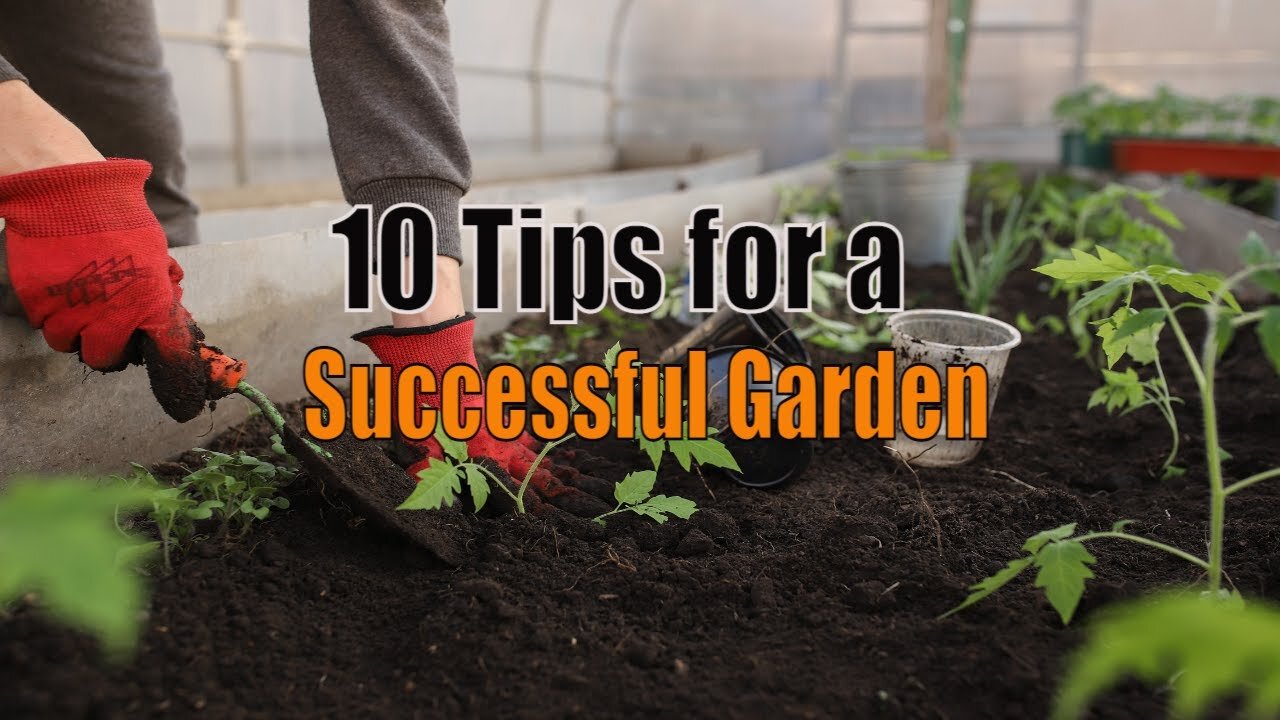Premium Only Content

10 Tips for a Successful Garden
10 Tips for a Successful Garden!
A garden is a great way to get fresh produce right from your own backyard. But if you want a successful garden, you need to follow some best practices. Here are ten tips for a successful garden:
Plant a variety of plants: A well-planned garden will have a variety of plants, from annuals to perennials. This will give your garden an interesting look and allow it to withstand different climates and weather conditions. When shopping for plants, make sure to purchase quality plants that will last longer and look better in your garden. Cheap plants will not withstand the elements or pests, and they will quickly become a nuisance in your garden.
Plant in groups: Grouping plants together will help them to share resources and avoid being attacked by pests or diseases. When planting, make sure to space plants evenly and choose a variety of plant types to add interest and diversity to your garden.
Choose the right soil: The type of soil your plants are planted in is important. Make sure the soil is rich in organic matter and has good drainage properties.
Get a soil test: Before you start planting, get a soil test to determine the type of soil your garden is planted in and the necessary amendments (fertilizer, water, etc.)
Create a garden bed: If you don't have the space for a full-grown garden, create a garden bed that is large enough for the plants you want and fill it with soil before planting. You could consider planting your plants in containers that can be moved around your house or outside when the weather permits.
Mulch: Apply a layer of mulch over the soil around your plants every year in the fall or spring to keep the soil cool in summer and warm in winter, reduce weed growth, and conserve moisture.
Use herbicides sparingly: Herbicides are powerful tools and should only be used when necessary to avoid harming your plants or damaging your lawn.
Prune: Pruning is essential for maintaining healthy plants. Remove dead branches, diseased limbs, and other unwanted growth from your plants to keep them in shape and prevent them from becoming overgrown.
Water: Water your plants regularly, using either overhead watering systems or drip irrigation to ensure they receive the water they need without drowning or standing in water. If your soil is too heavy or wet, water your plants regularly using drip irrigation or rain barrels instead of using overhead watering systems.
Fertilize: Fertilize your plants every two weeks during the growing season with a balanced fertilizer that is specifically designed for garden plants. Make sure to read the label before using fertilizers to avoid harming your plants
A well-manicured garden is a beautiful addition to any yard. With a little bit of planning and care, you can create a garden that will be enjoyed for years to come.
-
 19:03
19:03
sstrohmann
3 years agoBeginner Gardening Tips for a Successful Garden - Grow Your Own Food!
152 -
 1:41
1:41
KERO
4 years agoGrowing Your Garden: Successful summer planting
30 -
 LIVE
LIVE
GritsGG
3 hours agoWin Streaking! Coloring Hair at End of Stream! Most Wins 3435+ 🧠
134 watching -
 1:56:45
1:56:45
Dear America
3 hours agoNO MORE BURNING FLAGS!! 🇺🇸 Trump Signs Order Making It ILLEGAL!! + Trump Is SUING NEWSOM!
90.9K58 -
 LIVE
LIVE
JuicyJohns
3 hours ago $0.64 earned🟢#1 REBIRTH PLAYER 10.2+ KD🟢
95 watching -
 1:56:23
1:56:23
Law&Crime
2 hours ago $0.63 earnedLIVE: Adelson Matriarch Murder Trial — FL v. Donna Adelson — Day 3
21.3K -
 LIVE
LIVE
Major League Fishing
4 days agoLIVE! - Fishing Clash Team Series: Challenge Cup - Day 3
152 watching -
 LIVE
LIVE
Surviving The Survivor: #BestGuests in True Crime
2 hours agoCourt Stream: Donna Adelson Trial DAY 3 of Testimony
57 watching -
 LIVE
LIVE
Wendy Bell Radio
7 hours agoWhat Hill Will Democrats Choose To Die On?
7,403 watching -
 1:15:15
1:15:15
JULIE GREEN MINISTRIES
4 hours agoTHE CIA HAS BEEN A GIANT IN THIS LAND THAT WILL BE TAKEN OUT
109K164